I haven’t really done that much carp fishing in the last two or three years, having concentrated on barbel, but when I have been or have had a walk around a lake one of the things that has really struck me is the vast amount of gear that a lot of carp anglers seem to be taking with them. In fact it seems that some anglers feel almost naked if they haven’t got at least a barrow load of tackle.
I can appreciate the need for all this gear if you are going for a three or four day session especially at this time of year (even then, ask yourself, am I going fishing or camping?), but I am seeing guys with barrow loads of gear in the summer and they are only stopping for a day or a single night. I am sure that taking too much gear costs anglers a number of fish as it makes them very reticent to up sticks and move swims even when they can see fish on other parts of the lake.
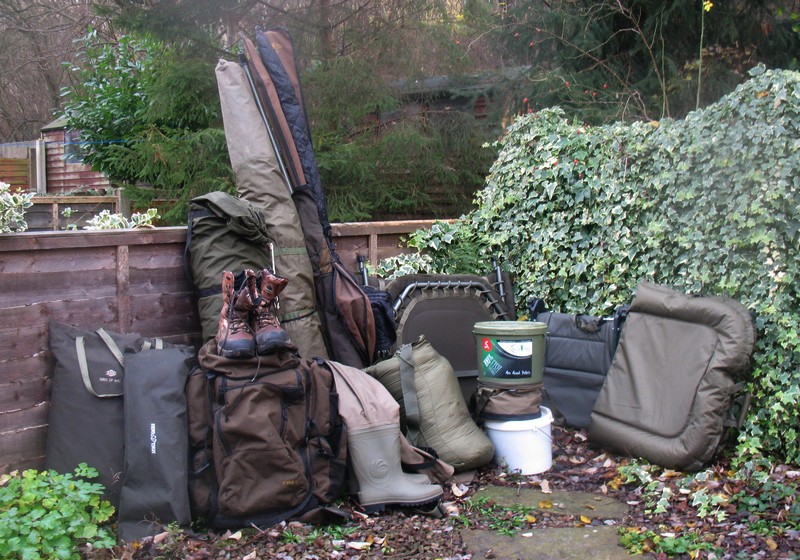
All the gear I would take for a week in France (except bait). Coincidentally this is about the amount of gear I see a lot of anglers taking just for a night over here.
Over the last thirty odd years I have fished loads of different waters both at home and abroad and I would say that on 95% of them, the most successful of all the anglers have been the ones who have been prepared to move to where the fish are (where possible), instead of just sitting tight and hoping the carp will eventually come to them.
Obviously when travelling abroad for a week you need to take quite a bit of kit, but even then I try to keep things to a bare minimum and just take the essentials. To get the best out of your week you will very often be forced to move two or three times during the session. I can remember fishing a lowly stocked lake of about 25 acres in France a few years ago with Paul Cooper and we both ended up fishing three different swims in order to keep up with the carps movement. It was well worth it though has we ended up with a number of big carp up to 55lbs+. If we had taken a lot of the paraphernalia that a lot of guys take (televisions etc), I am sure we would have stayed put and caught very little. Reading through Paul’s venue articles this year on the Angling Lines site, it is clear that he still adopts this ‘mobile’ approach whilst fishing abroad, so that he can move as soon as possible, if required.
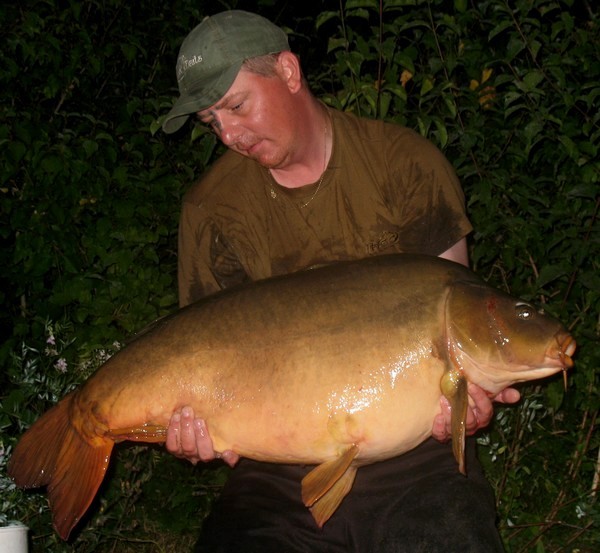
A large French mirror caught from the third swim fished during the session.
When going for a day session my gear is cut to the bare minimum and I can fit it all into a 45-litre rucksack and small bait bucket (which will include a few Quest Baits boilies, matching paste & pop-ups, a few pellets & a few floaters). Add a lightweight 3-rod quiver, lightweight chair and an unhooking mat and that should be all you need. With this amount of tackle you can have your rods reeled in and be moving on to fish in another part of the lake within 5 minutes.

Ready to go for a day session – what more do you need?
A couple of my local waters are very shallow and crystal clear. This is an example of the sort of thing I mean; I have seen some guys on these waters make as many as four trips with their barrow just to fish a short night session. Now because of the shallowness and clarity of the water the very fact that they have made all those trips with the barrow has probably ‘spooked’ the fish in the first place. The fish travel around a great deal and so mobility is the key along with concealing yourself and your tackle as much as possible. Usually when you catch a fish it spooks the others so you have to up sticks and move. By taking only the stuff you ‘really need’ you can do this and very often this move will produce a fish whilst the guys with mountains of gear stay in the same place blanking. On quite a few occasions I have taken a fish in the first hour.
If I get the impression the fish have ‘spooked’ from the area and I have not seen any sign in the next hour or so, I will up sticks and move. On quite a few occasions this has bought me another fish in the next couple of hours and so by being mobile you can quite easily end a short session with say a brace of twenties, whereas if you were loaded down with gear you may well have blanked. To me you can have the best baits, tackle and rigs in the world, but if you are not ‘on fish’ they are a waste of time.
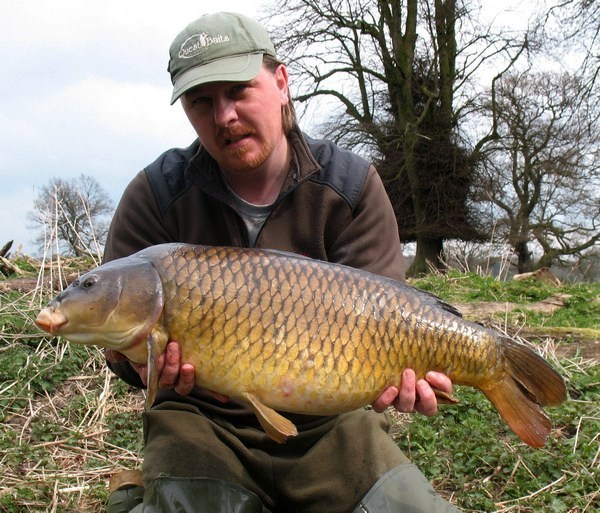
A nice 20+ common caught just 20 minutes after moving swim!
It also pays to be mobile through the winter months. When you consider that a carp may only feed for an hour or less during a twenty four hour period, then surely it makes sense to be able to move onto any fish that you may see as quickly as possible. I know that when its cold and wet and you are tucked up in your bivvy or behind your brolly you are probably going to be loathe to move but again if you have not got too much gear it is not a problem.
There are numerous occasions I can remember where a move in winter has paid dividends for me. For example I can remember fishing one particular club water about 15 years ago. This water was daytime only so I just used to take the bare minimum of tackle. I had been having quite decent success using critically balanced ‘apple-cored’ pop ups in conjunction with a Richworth capsule lead. This particular water was about 8 acres and no more than 4 feet deep. I had caught well from one end of the lake through most of the winter but one particular morning I was fishing this end of the lake with a really strong wind blowing down to that end.
It was February and after a couple of hours it just didn’t feel right with this wind howling. A quick move to the other end of the lake which felt right (back to the wind, calm water and warmer) and within an hour I had landed an upper double and a nice mirror of just over 25lbs which at the time was the third biggest in the lake. My mate who stuck it out at the other end of the lake blanked. If I had taken too much gear I would probably have stayed put and also blanked.
The mobile approach is also one that I use whilst barbel fishing. If I am fishing a stretch (especially in the winter when the feeding spells can be short) and I am not catching but other people are I will very often move swims. If other people are catching it shows that the barbel are feeding and if you are not catching it’s probably due to the fact there are no barbel in your swim. So to make the most of what can be short feeding spells I will move swims. This approach has brought several good fish on days where otherwise I have been struggling.
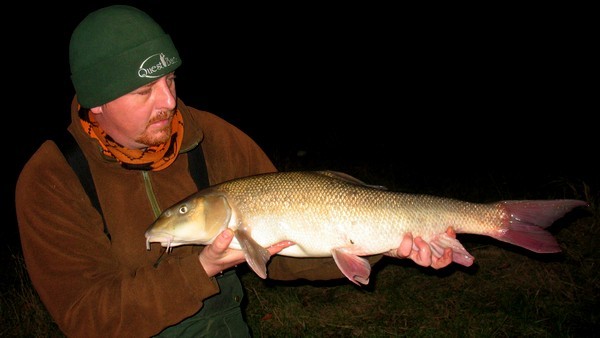
A nice Lower Severn double caught shortly after a move on what had been a blank day!
On some of the smaller rivers which contain well known large fish, there also seems to be a growing tendency towards the bivvy and bedchair option. Personally I don’t see how this can be fair to the fish, you will very often be fishing close to snags and I don’t see how, if you are fast asleep in your sleeping bag, that you can have instant control over the barbel, I am sure that a percentage of fish must get lost or are left trailing line by this practice. Surely the welfare of the fish is more important, than simply putting a hook in one!
You can still have the odd little luxury even when keeping things to a minimum. I like to listen to all the sport on the radio when I am out fishing. Last season I purchased a Roberts sports DAB radio. This really is a wonderful little tool, totally rechargeable (18 hours battery life), it gets crystal clear reception where I couldn’t get it before and is so small, it fits into the palm of my hand. I wouldn’t be without mine now, especially has it’s getting dark at 4pm.
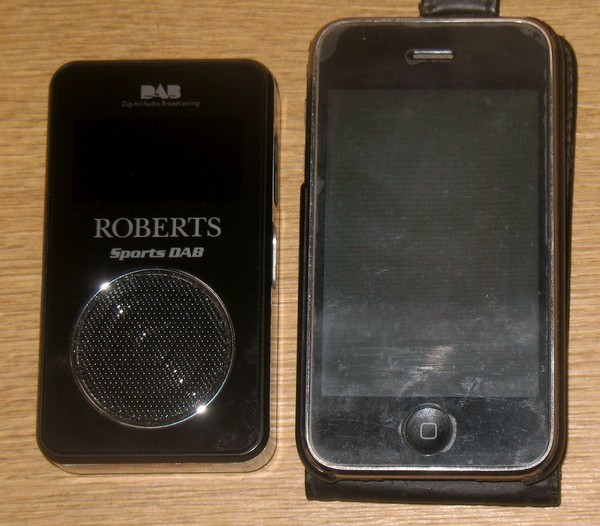
Smaller than my iphone!
Another quick thought, look at the stuff you actually buy for your fishing. Every piece of luggage these days seems to have loads of padding – why? Think about your rod pod or buzz bars for example, they are usually made of stainless steel or aluminium, so why on earth do you need a padded case to carry them in and some of the rod holdalls are so big you could get a surf board in them. I have even seen a padded case for the Korda Krusha, now this thing is so tough it will crush tiger nuts / pellets etc, so again why does it need to go in a padded case? I guess the point I am trying to make is that all this padding just adds extra bulk and weight and human nature being what it is, will probably deter you from moving to the other end of the lake even when you know you should.
So next time you load that barrow up ask yourself ‘do I really need all this stuff’. If the answer is no then go through all your boxes and bags and take out all the stuff you haven’t used for ages (or the just in case stuff which never gets used). For example how many leads etc do you actually need? You will be surprised at how much gear you can do without and next time you see fish moving at the other end of the lake you won’t be put off moving to them. After all five minutes fishing in the right place is worth more than a day in the wrong one.
Cheers,
Pat Gillett

I agree with much of what you have written Pat and will always travel as light as possible (even on long sessions in France) so if I feel a move is necessary then I will be more willing to do so.
I have experienced it working both ways, and where a “static” approach worked better than being mobile. I was at a French lake for a week’s session last year where the carp were notorious for moving from one end of the water to another, quite frequently. There were 8 anglers on and the water was about 10 acres. Out of the 8 anglers, 4 adopted a roving approach and 4 were static. The 4 roving anglers chased the carp around the lake with some success but often only getting one carp before the fish would move on again. One of the static anglers was on the top end of the lake and decided to stay put, whatever happened. Now whether by luck or good judgement (a certain element of each I think as he had been to the venue several times previously so knew the carp moved around) he ended up catching the most fish of the week including a couple of 40lb plus fish, and this was after blanking for the first 3 days!
However, I still favour the less gear/will move if I believe it is worthwhile approach as it gives me both options.
Hi Duncan,
I have also found that very often the static approach works better in France, especially on waters where the stocking density is relatively heavy. Once you have spot working, the sport usually gets better and better during the week, has you build the swim up. I still try and keep the gear to a minimum though, so that i won’t be put off moving if i need to.
Cheers,
Pat
Hi Pat
Good article.
Lots of anglers think that they travel light but in fact take everything including the kitchen sink. Travelling light in my eyes means only taking with you the items that you will use. I have seen your tackle set up for both a week’s French trip and for a short day session and we both reduce our tackle to a minimum, not bags and boxes for every individual item and every make of braid, hook swivel etc
10 Years ago, you, Roy and myself went to a French lake in the Brenne region for a week’s fishing and we caught loads of big carp. The 3 of us were in my Ford Focus estate with a roof box. Everything went in including all our bait, tackle and food. All our tackle was reduced but none of us were short of any essential items.
In respect of being static or mobile, it all depends on the lake.
With small lakes, if you are on the known hotspot feeding areas, what is the point of moving. Sit it out and wait the carp, they will eventually get on your baited area.
The only time that I move is if the wind or temperature has effected the carp, and moved them to the opposite side of the lake, this being on some of the bigger waters that I fish. Fish can be effected by new winds on small lakes but not anywhere near the amount as on some of the bigger waters, of say 15 acres plus. This is when you really do need to cut down on tackle. On bigger waters it can be fatal to remain sitting on your hands waiting for the fish to come and feed in your swim, as they could remain well out of reach for the whole of the week.
Paul
I totally agree, we have always called them “tackle tarts”, more bothered about all their luggage being the same shade of green than actually looking on how to catch a carp. I am quite young and do find a lot of anglers my age are like this, Being brought up carp fishing from my grandad I have a lot of old fashion sense when it comes to fishing. All I have is a Carp fishing barrow with basic stuff which i only need. I have never understood why people need 4 bait bags full of 20 different type of boilies, if you stick with one or two baits which have caught you fish in the past then you know 100% it’s not the baiting decision why your not catching but the method in the away you approach a water. I have always traveled light for other reasons such as movability around the lake, never understood why people who haven’t caught stay in the same spot.
Hi Jack, very sound way to approach your fishing and thanks for your input, tight lines!